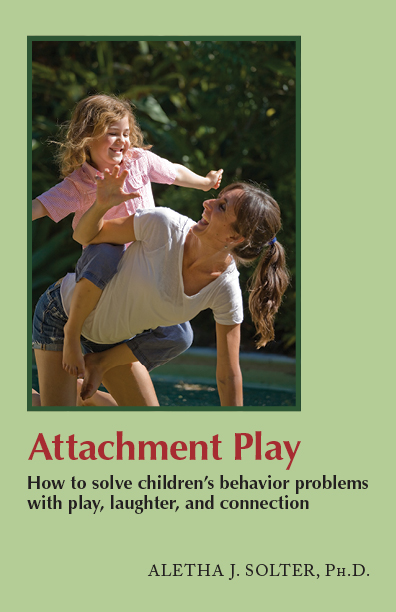Should I give an allowance for specific household duties?
by Aletha Solter, Ph.D.
Question:
I have a son who is almost seven. Evidently a lot of his friends get an allowance. Now he is constantly asking for one too. Our feeling is that he has certain duties required of him because he is a member of the household. He is responsible for making his bed, picking up his room and feeding the dog. I pay him $1 weekly to take out the garbage so that he can save money towards various things (usually karate items). Is giving him an allowance going to be equated with paying him for the normal things required of him? Is it a good thing? How do we know if he's ready? And, how much money is appropriate?
Answer:
Children benefit from having some money that they can spend as they wish. It helps them learn to make responsible spending decisions, develop math skills, and plan ahead and save for a desired goal. However, if you decide to give your child spending money, it is best if this is NOT contingent on your child's behavior or associated with chores. For example, you can give your child $1 or $2 a week as a regular allowance, but it should have nothing to do with helping around the house. You can gradually increase the amount as your child grows older.
There are several hidden pitfalls in the use of rewards with children (such as money, stickers, etc.). When rewards are contingent on children's behavior, research has shown that they cause the children to dislike whatever they have to do to get the rewards. In fact, one of the best ways to get a child to dislike doing something is to reward him for it! When rewards are no longer given, the child will be LESS likely to do it than before. In psychological terms, rewards destroy "intrinsic motivation." Studies have found that children who are rewarded for helping out actually become less cooperative and helpful than those who are not.
Children who are paid for household chores will stop doing them as soon as they have other sources of income. What if your child gets a job as a teenager and doesn't need your money any more? What if he inherits money from a long-lost relative? He won't want to take out the garbage any more, and it will be very difficult to convince him to do so! So instead of paying your son to take out the garbage, I encourage you to trust your intuition that guided you to expect him to make his bed, pick up his room, and feed the dog simply because he is a member of the household.
The goal in raising children is to nurture their inherent tendency to cooperate, rather than expect compliance through forms of control involving rewards or punishments. In order to foster a sense of cooperation, I recommend regular family meetings in which you decide as a family what chores need to be done and who will do them. If you include your son in the decision-making process, he will be much more likely to cooperate and willingly do his part. Together, you can make a detailed list of all the household chores to be done and let your son choose which ones he wants to do. He may want to do different jobs from time to time, and you can work this out as a family.
Family meetings are more effective if you begin each meeting by mutual appreciations, and rotate leadership so that children can also lead the meetings. Don't use the meeting format only for discussing chores or problems. Be sure to use meetings for other items as well, such as planning a family vacation. Any member can add something to the agenda. Decisions should be reached by general agreement (consensus).
I have never paid my children or rewarded them in any other way for doing chores. They began helping regularly when they were about four years old, and continued helping through their teenage years until they left home. When they forgot to do the chores that they agreed to do, I simply brought it up at the next family meeting, and we discussed ways to help them remember. Sometimes they wanted to switch to other jobs. We found that job charts were useful in helping everyone remember what their jobs were.
My children surprised me at times by spontaneously doing chores that nobody asked them to do! They were also usually willing to pitch in when there was extra work to be done. I don't think that this tendency to help would be as likely in children who are accustomed to being paid for doing chores. I gave my children a regular allowance so they could learn to budget money, but this allowance had nothing to do with chores.
My recommendation, therefore, is to keep the allowance totally separate from the chores. That way, your son will learn the value of cooperation, and will feel that he is helping to contribute his share to the family. Through family meetings he will learn how a truly democratic decision-making process works.
Click on this article for more information about family meetings: Family meetings for conflict resolution
About Aletha Solter:
Aletha Solter, PhD, is a developmental psychologist, international speaker, consultant, and founder of the Aware Parenting Institute. Her books have been translated into many languages, and she is recognized internationally as an expert on attachment, trauma, and non-punitive discipline.
Aware Parenting is a philosophy of child-rearing that has the potential to change the world. Based on cutting-edge research and insights in child development, Aware Parenting questions most traditional assumptions about raising children, and proposes a new approach that can profoundly shift a parent's relationship with his or her child. Parents who follow this approach raise children who are bright, compassionate, competent, nonviolent, and drug free.
For more information about eliciting cooperation in children without punishments or rewards, see Aletha Solter's books, Cooperative and Connected, Raising Drug-Free Kids and Attachment Play


